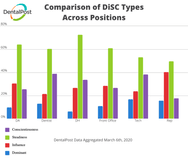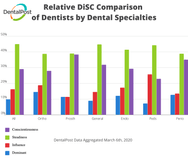
DISC Assessments for Dental Professionals
And Why It Matters for Dental Practices
DentalPost Offers FREE DISC Assessments to All DentalPost Users
Knowing a Dental Professional’s DISC Profile Helps Build Well-Rounded Dream Dental Teams
Tonya Lanthier, CEO and Founder of DentalPost, explains DISC with Jasmine Haley on her Beyond the Prophy podcast. Tune in to learn more!
Understanding differences in personalities makes it possible to integrate individual team members with less troubleshooting. On a typical dental team, there are varying degrees of compatibility, not just toward tasks but interpersonal relationships as well.
Brief History of DISC
The DISC Model was first proposed in the late 1920’s by Dr. William Moulton Marston, a Harvard graduate in physiological psychology. His vision was later changed into modern versions of DISC to stand for Dominance (D), Influence (I), Supportive (S), and Compliance (C).
D is more outgoing and task-oriented, while I is more outgoing and people-oriented. C is more reserved while being task-oriented, and S is reserved while being people-oriented.
DISC in Your Dental Office
Knowing the personality of applicants and employees helps you identify how well your patients will be taken care of. In addition, DISC is helpful in forming robust teams, so that you don’t have all leaders or all followers in the office and they can bring their unique viewpoints to give you a whole perspective on how to have the best, most efficient dental practice.
Once the DISC Assessment is taken, the personality profile results will reveal strengths and weaknesses in the work environment. The profiles include DI, ID, DS/SD, DC, CD, IS, SI, IC/CI, SC, and CS. Below are the core traits of D, I, S, and C.
Who Are Your D’s?
D: Dominance
Core Traits: Direct, Decisive, Driven
People high in D focus on achieving results. They favor action over planning and are typically guided by a long-term, big-picture vision of what can be accomplished. D’s seek challenges and take risks that will yield big rewards. They can quickly size up a situation and decisively determine a course of action.
High D’s are assertive, direct, and competitive. They don’t like to waste time and their bottom-line nature drives how they communicate. They want straight answers and “call it like it is.”
D’s are self-starters who challenge the status quo. They thrive in positions of power and seek to control their own destinies. Their tenacity and natural confidence enable them to accomplish even the most demanding objectives.
Who Are Your I’s?
I: Influence
Core Traits: Inspirational, Influential, Intuitive
People with high I’s have active minds, seek constant stimulation, and enjoy interacting with people and the world around them. This allows them to thrive in social environments and drives their thirst for adventure.
With their boundless optimism and innate people skills, I’s are highly persuasive and inspirational. They have fun wherever they go and infuse play and positive energy into all aspects of their lives.
The I’s intuition and free-sprited nature enable them to create “out of the box” ideas. They don’t get bogged down in minutiae, as details would only restrict their imagination. I’s are future-focused and live in the realm of possibility, where everything is exciting and achievable.
Who Are Your S’s?
S: Supportive
Core Traits: Sincere, Steady, Sympathetic
People with high S’s seek to minimize conflict and create calm, safe environments. S’s are friendly, compassionate people who patiently listen with empathy. They build deep, loyal relationships and are steadfast friends and partners.
S’s favor practical, tried-and-true procedures that ensure stability. They like familiar, predictable patterns that produce consistent and reliable outcomes. They often work behind the scenes and prefer to support, rather than to lead.
Who Are Your C’s?
C: Compliance
Core Traits: Cautious, Concise, Correct
People with high C’s focus on achieving complete and total accuracy in everything they do. They constantly question processes and ideas to ensure that things are done properly. C’s are systematic, practical, and efficient.
Rather than being guided by the emotion of a situation, C’s make decisions based upon logical analysis of observable, quantifiable information. While C’s often prefer to work independently, their even-tempered nature enables them to remain objective and diplomatic when dealing with others.
Relating DISC Back to Your Dental Practice
When you learn more about the DISC traits, it becomes easier to know which personalities will perform the best for each role and complement each other in the dental office. Understanding these traits means a higher level of communication, and a happier office which results in high productivity and patient care. Throughout the dental office, there is a trend of having a high S and lower D, especially in pediatric care. I and C tend to be steady in the middle, followed by D at the low end.
We surveyed over 850,000 users and here’s what our numbers show:
Successful Dental Hygienists typically have higher Influence (I), because they will be interacting with patients and are influencing and selling the patient on their oral health dental procedures. People with higher Dominance (D) also do very well to be the driver of the hygiene department. Hygienists with a higher I perform well with Dentists with a higher D, but they could also have a higher I with lower traits of D, S, and C. So, decide which trait is needed most in the office. The dentist needs to decide which traits are most needed based on their own communication skills and personality, as well as the teams.
Dental Assistants with a high Supportive (S) perform very well because they will be supporting the dentist to the best of their ability. Also, Compliance (C) will help in ensuring that the processes requested by the dentist will be done correctly.
Dental Front Office Managers can have a higher Dominance (D) because they should be results focused, exude confidence to patients, and be able to manage a variety of tasks and give recommendations for better dental office practices and procedures. However, D is not a very common personality type and other types could perform well in this role as well, especially a higher S. Higher Compliance (C) is also a successful trait here in ensuring that the practice is efficient and can work independently while achieving goals. Personality types C/SC/CS would be better for work like insurance/book keeping.
Dental Front Office Receptionists with higher Influence (I) do well in their jobs because they are speaking and interacting with patients daily, as well becoming the first face and voice a patient sees. It is imperative for them to have very good people skills. Higher Supportive (S) is good for this position as well because they will also have to listen to patients and be empathetic to their needs, especially when they are performing customer service related tasks.
Dentists shouldn’t be low in any particular trait, as they have to have some Dominance (D) to run the office and be able to determine how the practice should be run and determine a course of action; Influence (I) helps in day to day interactions with patients because building a good relationship with patients in paramount to the success of the Dental Practice. The Supportive (S) trait gives the dentist empathy with a patient to further to build the trust in the relationship, and be able to create a good environment for all the employees in the practice. Compliance (C) is critical because dentist’s work must be correct and logical in all decisions they make either within the practice or diagnosing a patient and treating them accordingly. However, a high C trait can be too detail-focused.
Use DISC in Your Dental Hiring Process
Your patients are the most important part of the practice; take care of them with an effective, efficient team. Build dynamic teams with DentalPost’s DISC assessments, part of our lineup of crucial assessments needed to deliver the best patient care and have high performing teams. It’s not an absolute, but data has proven a well-balanced team of personality traits functions at a higher level. An example of a dynamic pairing is a person with a high D & another with a high C; D can drive the project, but the C can help come behind the D to fill in the detail work. We’d also like to note that personality traits may change over time depending on responsibilities, roles, life status, and changes, and can alter/shift to the personality(ies) you’re with, like partners, coworkers, children, or peers.
For Example:
DentalPost’s Founder, Tonya Lanthier, is an ID with an evenly high I and D. She worked well with D dentists for short-term temp work; however, in the long term, she worked very well with high C/D, C/S, C/I, S/I, S/D, and even I doctors.








